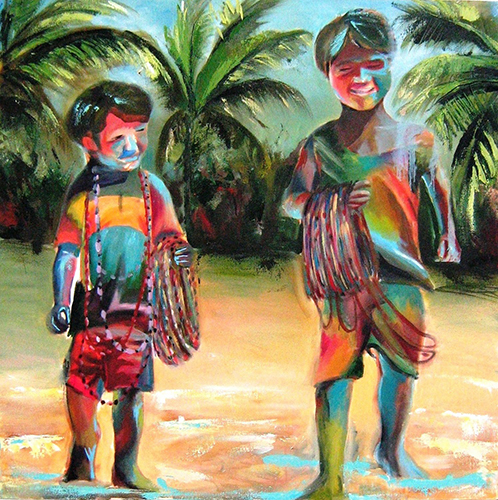Indigenous knowledge and climate change
the incorporation of traditional knowledge as a prerequisite for climate justice
DOI:
https://doi.org/10.18227/2317-1448ted.v29i02.7879Keywords:
Indigenous peoples, Climate Change, Indigenous KnowledgesAbstract
Climate change affects ecosystems and populations unevenly, with indigenous peoples among the most affected. Starting from the premise that indigenous peoples not only disproportionately face the impacts of climate change but also play a crucial role in adaptation and mitigation to this process, our article discusses the importance of not only viewing indigenous communities as ‘vulnerable’ to the climate phenomenon but also recognizing, respecting, and incorporating their traditional knowledge as essential in addressing environmental issues. We argue that to truly achieve climate justice, it is fundamental to incorporate indigenous knowledge into the climate discourse, decolonizing discussions and seeking the redistribution of burdens and benefits. This requires an epistemological shift, which can only occur with greater participation of indigenous peoples in global negotiations.
References
BELFER, E. et al. Pursuing an Indigenous Platform: Exploring Opportunities and Constraints for Indigenous Participation in the UNFCCC. Global Environmental Politics, v. 19, n. 1, p. 12–33, fev. 2019.
BORTOLOTTO, F. Participação indígena brasileira na Convenção do Clima: a construção da agenda climática como pauta de luta. Dissertação de Mestrado—Brasília: Universidade de Brasília, 2020.
CUSATO, E. T. Beyond Symbolism. Journal of International Criminal Justice, v. 15, n. 3, p. 491–507, 1 jul. 2017.
DEPLEDGE, J. The organization of global negotiations: constructing the climate change regime. Sterling, VA: Earthscan, 2005.
DOROUGH. The Use of Indigenous Traditional Knowledge in Climate Change Strategies | Wilson Center. Online, 3 nov. 2021. Disponível em: <https://www.wilsoncenter.org/event/use-indigenous-traditional-knowledge-climate-change-strategies>. Acesso em: 30 jul. 2023
FORD, J. D. et al. Including indigenous knowledge and experience in IPCC assessment reports. Nature Climate Change, v. 6, n. 4, p. 349–353, abr. 2016.
HUMAN RIGHTS COUNCIL. Resolution 10/4. Human rights and climate change. Geneva: United Nations, 25 mar. 2009.
IIPFCC. Declaration of the First International Indigenous Peoples’ Forum on Climate Change. The Hague: International Indigenous Peoples’ Forum on Climate Change, 12 nov. 2000.
IPCC. Climate Change 2022 – Impacts, Adaptation and Vulnerability: Working Group II Contribution to the Sixth Assessment Report of the Intergovernmental Panel on Climate Change. Cambridge: Cambridge University Press, 2023.
JUN, J. et al. Indigenous peoples, water, and climate change. Stockholm: Stockholm International Water Institute, 2020.
KRENAK, A. Um Outro Nome para as Mudanças Climáticas: “Tudo o que fere a terra fere aos filhos da terra”. Em: LIMA, A.; FANZERES,
A.; ALCÂNTARA, L. (Eds.). Mudanças Climáticas e a Percepção Indígena. 2. ed. Mato Grosso: Operação Amazônia Nativa (OPAN), 2018. p. 20–23.
KRONIK, J.; VERNER, D. Indigenous Peoples and Climate Change in Latin America and the Caribbean. Washington, DC: The World Bank, 2010.
NAKASHIMA, D. J. Weathering uncertainity: traditional knowledge for climate change assessment and adaptation. Paris, Darwin: UNESCO; UNU-IAS, 2012.
NUSDEO, A. M. DE O.; SILVA, M. G. DE P. E. A proteção dos Direitos Humanos e a agenda climática: convergência e desafios. Diálogos Socioambientais, v. 6, n. 16, p. 9–12, mar. 2023.
OLIVEIRA, A. R. DE; DO VALE, S. B. Amazad Pana’adinhan: percepções das comunidades indígenas sobre as mudanças climáticas, região da Serra da Lua – RR. Boa Vista: Conselho Indígena de Roraima (CIR), 2014.
ORGANIZAÇÃO DAS NAÇÕES UNIDAS. United Nations Declaration on the Rights of Indigenous Peoples. New York: United Nations, 13 set. 2007.
POWLESS, B. An Indigenous Movement to Confront Climate Change. Globalizations, v. 9, n. 3, p. 411–424, jun. 2012.
SULTANA, F. The unbearable heaviness of climate coloniality. Political Geography, v. 99, p. 1–14, 2022.
TÁÍWÒ, O. O. Reconsidering Reparations. Oxford; New York: Oxford University Press, 2022.
UNFCCC. Report of the Conference of the Parties on its twenty-third session, held in Bonn from 6 to 18 November 2017. Addendum. Part two: Action taken by the Conference of the Parties at its twenty-third session. Bonn: United Nations Framework Convention on Climate Change, 8 fev. 2018.
UNITED NATIONS CLIMATE CHANGE SECRETARIAT. Background note: Process to strengthen the observer engagement in the UNFCCC. Bonn: UNFCCC, 2022.
UNITED NATIONS CONFERENCE ON SUSTAINABLE DEVELOPMENT. The future we want. Rio de Janeiro: United Nations, 22 jun. 2012.
VELAND, S. et al. Procedural vulnerability: Understanding environmental change in a remote indigenous community. Global Environmental Change, v. 23, n. 1, p. 314–326, fev. 2013.
YAMIN, F.; DEPLEDGE, J. The international climate change regime: a guide to rules, institutions and procedures. Cambridge; New York: Cambridge University Press, 2004.
Downloads
Published
How to Cite
Issue
Section
License
Copyright (c) 2024 Textos e Debates

This work is licensed under a Creative Commons Attribution 4.0 International License.
The copyrights for the published articles belong to the author, the journal just have the rights of the first publication. Authors may only use the same works in other publications clearly indicating this journal as the original publication.





